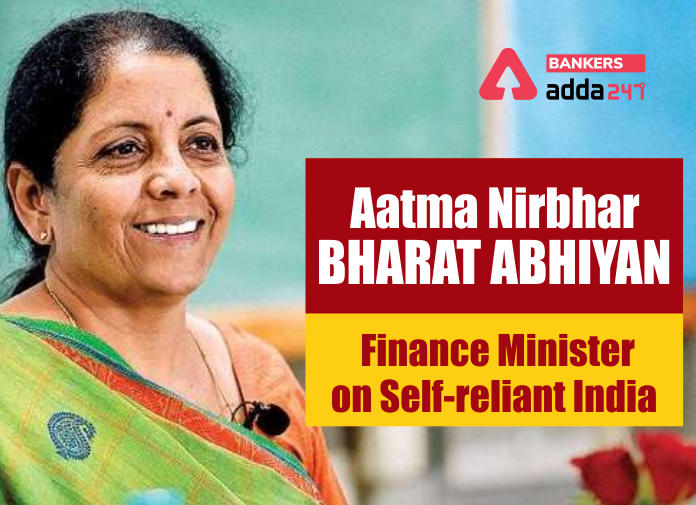
Union Finance Minister Nirmala Sitharaman has announced the details of the 5th tranche of Economic Relief Package for “Aatmanirbhar Bharat Abhiyan” amid COVID-19 pandemic. This 5th tranche is the part of economic package of Rs 20 lakh crore has been announced with the prime objective of making India self-reliant.
Highlights of measures announced in 5th tranche, as part of Economic Relief Package for “Aatmanirbhar Bharat Abhiyan”:
1. Allocation for MGNREGS:
- Government of India has decided to allocate an additional amount of Rs 40,000 crore under MGNREGS which will help in generating total work of nearly 300 crore person days.
- With this allocation, GoI will ensure to address the need for more work including returning migrant workers in Monsoon season as well.
- It will also led to the creation of larger number of durable and livelihood assets including water conservation assets.
- Hence it is expected to boost the rural economy through higher production.
2. For Health Sector:
- Government of India has decided to increase the Public Expenditure on Health. It will also include the investments in grass root health institutions in order to ramp up Health and Wellness Centres in rural as well as urban areas.
In order to prepare India for any future pandemics, following measures will be taken:
- Will open Infectious Diseases Hospital Blocks in all districts.
- Will strengthen the lab network and surveillance by setting up Integrated Public Health Labs in all districts, Block Level Labs as well as Public Health Unit to manage the future pandemics.
- Will also encourage Research National Institutional Platform for One health by ICMR.
- National Digital Health Mission will be implemented and National Digital Health Blueprint will also be prepared.
To provide Technology Driven Education:
Government of India has decided to launch PM-eVIDYA programme immediately for multi mode access to digital/online education. This programme will consist the following:
- A DIKSHA programme will provide “one nation, one digital platform” for school education in states/UTs. It will also include the launch of Energized Textbooks for all grades.
- Will launch one earmarked TV channel per class from 1 to 12 following the concept of “one class, one channel”.
- Extensive use of Radio, Community radio and Podcasts to provide education.
- Special e-content will be launched for visually and hearing impaired students.
- Will permit top 100 universities to automatically commence online courses by 30th May, 2020.
- An initiative titled “Manodarpan” will be launched immediately to provide psychosocial support to students, teachers and families for their mental health and emotional well being.
- Will launch New National Curriculum and Pedagogical framework for school, early childhood as well as teachers, which would be integrated with the global and 21st century skill requirements.
- National Foundational Literacy and Numeracy Mission will be launched by December 2020 to ensure that every child attains learning levels and outcomes in grade 5 by 2025.
3. IBC related measures:
- Government of India will exclude the COVID-19 related debt from the definition of “default” under the Code for the purpose of triggering insolvency proceedings.
- Fresh initiation of insolvency proceedings will be suspended up to one year depending upon the situation of pandemic.
- For MSMEs, a “Special insolvency resolution” framework under the Section 240A of the Code, will be notified soon.
- The minimum threshold to initiate insolvency proceedings has been raised from Rs 1 lakh to Rs 1 crore to largely insulate the MSMEs.
4. Decriminalisation of Companies Act defaults:
- Government of India has decided to decriminalize the Companies Act violations involving minor technical and procedural defaults such as shortcomings in CSR reporting, inadequacies in board report, filing defaults, delay in holding AGM.
- Majority of the compoundable offences sections will be shifted to internal adjudication mechanism (IAM) and the powers of RD for compounding will be enhanced. Hence, 58 sections will be dealt with under IAM as compared to 18 earlier.
- The above amendments are expected to de-clog the criminal courts and NCLT.
- 7 compoundable offences altogether will be dropped and 5 will be dealt with under alternative framework.
5. Further key reforms for Ease of Doing Business for Corporates includes:
- Direct listing of securities by Indian public companies in permissible foreign jurisdictions.
- Private companies which list Non-Convertible Debentures on stock exchanges will no longer be regarded as listed companies.
- The provisions of Part IXA (Producer Companies) of Companies Act, 1956 will be included in the Companies Act, 2013.
- Power to create additional/ specialized benches for NCLAT.
- There will be lower penalties for all defaults for Small Companies, One person Companies, Producer Companies Start Ups.
6. Public Sector Enterprise Policy:
Government of India will launch a new coherent policy where all sectors are open to the private sector while public sector enterprises will play an important role in defined areas.
Accordingly government will announce a new policy in which:
- List of strategic sectors requiring presence of PSEs in public interest will be notified.
- In strategic sectors, at least one enterprise will remain in the public sector but private sector will also be allowed in that sector.
- In other sectors, PSEs will be privatized (timing to be based on feasibility etc).
- In order to minimize wasteful administrative costs, number of enterprises in strategic sectors will ordinarily be only one to four while others will be privatized/ merged/ brought under holding companies.
7. Supporting state governments:
Centre has consistently extended generous support to states in this hour of need amid COVID-19 pandemic.
- The Devolution of taxes Rs 46,038 crore in April was given fully as if Budget Estimates were valid even though actual revenue shows unprecedented decline from Budget Estimates
- Despite Centre’s stressed resources, the Revenue Deficit Grants of Rs 12,390 crore was given to states on time in the month of April as well as May
- SDRF funds of Rs 11,092 crore was released in first week of April
- Release of over Rs 4,113 crores from Health Ministry for direct anti Covid activities
Also, at Centre’s request to the Reserve Bank of India, the RBI has increased:
- Ways Means Advance limits of States by 60%.
- Number of days state can be in continuous overdraft from 14 days to 21 days.
- Number of days state can be in overdraft in a quarter from 32 to 50 days.
States net borrowing ceiling for 2020-21 is Rs 6.41 lakh crores, based on 3% of Gross State Domestic Product (GSDP):
- 75% thereof was authorised to them in March 2020 itself and timing is left to the States.
- States have so far borrowed only 14% of the limit authorised 86% of the authorised borrowing remains unutilized.
- In view of the unprecedented situation, Centre has decided to accede to the request of state governments and has increased the borrowing limits of States from 3% to 5% for 2020-21 only, which will give States extra resources of worth Rs 4.28 lakh crores.
Part of the borrowing will be linked to specific reforms (including recommendations of Finance Commission) to:
- ensure sustainability of the additional debt through higher future GSDP growth and lower deficits.
- promote welfare of migrants and reduce leakage in food distribution
- increase job creation through investment
- safeguard the interests of farmers while making the power sector sustainable
- promote the urban development, health and sanitation
Reform linkage will be in four areas universalisation of ‘One Nation One Ration card’, Ease of Doing Business, Power distribution and Urban local body revenues
- Department of Expenditure will notify a specific scheme on the following pattern:
Unconditional increase of 0.50%. - 1% in 4 tranches of 0.25% with each tranche linked to clearly specified, measurable and feasible reform actions.
- Further 0.50% will be made available if the milestones are achieved in at least three out of four reform areas.


 Indian Olympic Medal Winners List Till N...
Indian Olympic Medal Winners List Till N...
 Who is the Inventor of the Gramophone?
Who is the Inventor of the Gramophone?
 HS Dhaliwal Appointed New DGP Of Andaman...
HS Dhaliwal Appointed New DGP Of Andaman...
